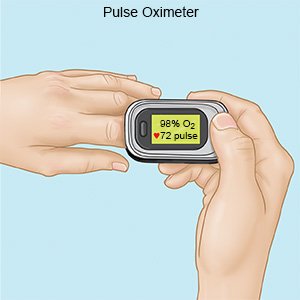Pulse Oximetry
Medically reviewed by Drugs.com. Last updated on Aug 4, 2025.
What is pulse oximetry?
Pulse oximetry measures the percentage of oxygen in your blood. It gives the closest measurement without having to draw your blood. A pulse oximeter (pulse ox) can be used all the time or only when you feel short of breath.
Why are my blood oxygen levels important?
Every cell in your body needs oxygen to work properly. You may need extra oxygen if your measurement is low. The pulse ox helps your healthcare provider decide if you need extra oxygen. It can also help show how much extra oxygen you need, and when you need to use it. You may only need extra oxygen when you are asleep. You may need more oxygen with activity.
How does a pulse ox work?
- The pulse ox may be placed on your finger, toe, or earlobe. Light is passed from the pulse ox through your blood. The pulse ox calculates the percentage of blood that is carrying oxygen. At least 89% of your blood should be carrying oxygen. It also measures your heart rate and gives you a reading of both the percentage and heart rate.
- You will get the best measurements when your hand is warm, relaxed, and at the level of your heart. Make sure all nail polish is removed. Do not smoke, because your percentage will not be correct. The device does not know the difference between carbon monoxide from your smoke and oxygen. Ask your healthcare provider what your percentage should be if you smoke. If you smoke, it is never too late to quit.
Do I need my own pulse ox?
Your healthcare provider will tell you if you should get a pulse ox, and where to get it. You may be given a percentage target for when you are at rest and another target for activity. The following are times you may need to monitor your oxygen levels:
- You are prescribed oxygen.
- You are exercising or have just finished.
- You are flying or visiting high altitude places.
 |
Care Agreement
You have the right to help plan your care. Learn about your health condition and how it may be treated. Discuss treatment options with your healthcare providers to decide what care you want to receive. You always have the right to refuse treatment. The above information is an educational aid only. It is not intended as medical advice for individual conditions or treatments. Talk to your doctor, nurse or pharmacist before following any medical regimen to see if it is safe and effective for you.© Copyright Merative 2025 Information is for End User's use only and may not be sold, redistributed or otherwise used for commercial purposes.
Further information
Always consult your healthcare provider to ensure the information displayed on this page applies to your personal circumstances.
